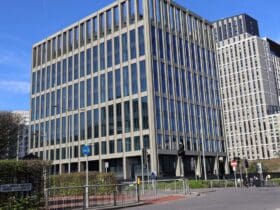First Minister Mark Drakeford has scrapped plans to build the £1.4bn M4 relief road.
[aoa id=”1″]
Mr Drakeford has said to have axed the scheme due to the high cost and the environmental impact that it would have on the area around Newport.
The relief road was tabled as a solution to tackle congestion at the Brynglas tunnels in Newport, which can leave that stretch of the M4 in lockdown during peak times.
[/aoa]
Robert Lloyd Griffiths, Director IoD Wales said:
“This is desperately disappointing. Congestion is holding us back and is also deterring investors from considering us as viable traders. We firmly believe the Black Route is the best option for the most impactful and integrated transport option to best benefit Wales’ economy.
“For the business leaders I speak to day in, day out, the message on improving the M4 was clear: get it done and get it done quickly. We now know this is not going to happen. The lingering and procrastinating has done nothing for Wales’ reputation and the more economically and environmentally viable option which have been debated should have been thoroughly considered and presented today.
“The perennial issue of a relief road featured prominently in our Ten Point Plan for the Economy, which we presented before the last Welsh General Election, with its potential to dramatically and positively impact transport links for the Wales economy.
“We have conducted various surveys among our members for some time now, which have revealed that the M4 and major road links to north Wales still need to be drastically improved at busy junctions – congestion must be relieved and accident figures reduced. This is a dark day for the economy of Wales.”
Ian Price, CBI Wales Director, said:
“This is a dark day for the Welsh economy. After decades of deliberation and over £40m spent, no problem has been solved today. Congestion and road pollution around Newport can only increase. Economic growth will be stifled, confidence in the region will weaken and the cost of an eventual relief road will rise
“Today’s announcement is a short-term measure that regrettably solves nothing and sends the message that Wales is not open for business.
“As the Welsh Government said at the public inquiry, the black route would emit less carbon emissions than the current road and the whole project would be carbon neutral by 2070. The wider south Wales region around Cardiff and Newport constitute only 4% of Welsh carbon emissions in total. That figure will now likely rise at a higher rate than if the black route had been built.
“While we struggle to see what alternative could be better than the M4 black route, the ball is back in the Welsh Government’s court to deliver their Plan B. An urgent and credible solution to the problem of congestion around the Brynglas tunnels must now be developed.”
Heather Myers, CEO, South and Mid Wales Chamber of Commerce said:
“The South and Mid Wales Chamber of Commerce, along with the entire business community that we represent, is bitterly disappointed with today’s news.
“With the decision not to build the relief road and, currently, no alternative solution proposed to help alleviate the congestion along this stretch of the M4, we are again left in limbo. Businesses who move their goods around and people who travel to work along the motorway will face years more of chaos, hindering economic growth.
“Opposition to the M4 relief road has always been centred around the argument that there are cheaper, more environmentally friendly solutions to the recognised problem, but we are astonished that these alternative solutions have not been put forward today.
“The South and Mid Wales Chamber of Commerce will be keeping pressure on the Welsh Government to come up with a solution, so that future generations of commuters, tourists, delivery drivers, and people just trying to get across the country aren’t left in traffic jams around Newport for decades to come.”
Statement from CCR EGP Chair Frank Holmes and CCR Business Council Chair Neil Brierley:
“We are extremely disappointed by the decision to not proceed with a M4 relief road around Newport, and we must now work to adopt alternative infrastructure and technologies to ensure South Wales keeps moving.
“This new road was critical in supporting and enabling the economic and industrial strategy for growth for South-East Wales, along with adjacent regions in Wales.
“We fear that without it, South-East Wales – one of the fastest growing in the UK – will become paralyzed by an ageing transport infrastructure operating beyond capacity.
“We welcome the £734m investment in the South Wales Metro, but the Metro can only do so much and is not going to resolve all our transport ills, certainly not in fully accommodating the transport of heavy goods. It needs to be delivered within the context of a wider plan.
“Connectivity through clean growth and future mobility is a key component of our Economic and Industrial Growth Plan for the region.”
Frank Holmes said: “The Cardiff Capital Region must now champion a determined commitment to seek a positive way forward by adopting alternative transport infrastructure and communication technologies to ensure business and access to South Wales remain open, and it does so for the wider benefit of enterprise throughout Wales.
“A sustainable and fit-for-future mobility system through private sector investment and delivery is something that won’t just get the region moving, but something which in itself could be a competitive edge.”
Neil Brierley said: “We need to ensure the Cardiff Capital Region remains economically competitive with the rest of the UK, and that means ensuring we have transport routes which allow effective flow of goods and movement of labour.
“Failure to remain economically competitive will mean we will be simply unable to resolve the historical economic and social issues we are trying to address through a cohesive economic growth plan for the future prosperity of all. It is imperative that a series of alternative infrastructure interventions are developed, in conjunction with the South Wales Metro, to deliver the badly needed improvements to our transport network.”
Reacting to the First Minister’s announcement this morning that the Welsh Government will not be backing an M4 relief road around Newport, Justin Millett, lead director in JLL’s Cardiff office, said:
“This is hugely disappointing news. Despite significant challenges, the Cardiff capital region has been showing promising signs of growth. But investment in infrastructure is crucial to optimising that growth.
“Demand for industrial and logistics space in Wales has been rising steadily, buoyed by the shift to online retail and the need for warehousing and distribution space. The M4 relief road would not only have shored up that demand but helped reassure property owners to invest in much-needed new, contemporary stock.
“This decision risks a two-tier land market in South Wales with land and property on the East side of the Brynglas tunnels out-valuing areas to the West.”
Tamara Hooper, RICS (Royal Institution of Chartered Surveyors) Policy Manager, England and Wales, said:
“RICS is disappointed with the announcement made today by the First Minister that plans for a M4 relief road will be scrapped.
“The report into the road was finalised after 13 months in December 2018, however no decision or statement was made for a further 6 months. The delays and ultimate decision have only served to compound the economic impacts upon Wales, in an already uncertain time for business, industry and growth.
“RICS believes that the relief road is vital infrastructure for the continued growth of the Welsh economy, an important factor which companies consider when they are making investment decisions is the transport links and interconnectivity. The relief road also forms part of a holistic planning approach to stimulate and support Welsh economy, housing and other transport infrastructure, it is also vital to health as it eases congestion and air pollution.
“As Wales prepares to leave the EU along with the rest of the UK, the First Minister must clearly lay out alternative plans to open Wales up to growth and investment to financially bolster the nation’s main cities and to ease air pollution caused by the gridlock not having this relief road causes.”








Leave a Reply
View Comments